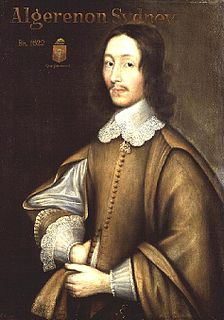A Quote by Thomas Browne
If there be any among those common objects of hatred I do contemn and laugh at, it is that great enemy of reason, virtue, and religion, the multitude; that numerous piece of monstrosity, which, taken asunder, seem men, and the reasonable creatures of God, but, confused together, make but one great beast, and a monstrosity more prodigious than Hydra.
Related Quotes
Those may justly be reckoned void of understanding that do not bless and praise God; nor do men ever rightly use their reason till they begin to be religious, nor live as men till they live to the glory of God. As reason is the substratum or subject of religion (so that creatures which have no reason are not capable of religion), so religion is the crown and glory of reason, and we have our reason in vain, and shall one day wish we had never had it, if we do not glorify God with it.
Now if there is any gift of the gods to men, it is reasonable that happiness should be god-given, and most surely god-given of all human things inasmuch as it is the best. But this question would perhaps be more appropriate to another inquiry; happiness seems, however, even if it is not god-sent but comes as a result of virtue and some process of learning and training, to be among the most god-like things; for that which is the prize and end of virtue seems to be the best thing in the world, and something god-like and blessed.
Fruits are always of the same nature with the seeds and roots from which they come, and trees are known by the fruits they bear: as a man begets a man, and a beast a beast, that society of men which constitutes a government upon the foundation of justice, virtue, and the common good, will always have men to promote those ends; and that which intends the advancement of one man's desire and vanity, will abound in those that will foment them.
Religions have been universal in the sense that all the people we know anything about have had a religion. But the differences among them are so great and so shocking that any common element that can be extracted is meaningless.... The older apologists for Christianity seem to have been better advised than some modern ones in condemning every religion but one as an impostor, as at bottom some kind of demon worship or at any rate a superstitious figment.
There are those, of course, who deny that they need any form of authority. They are the popular atheists and agnostics. Such men say that they must be shown by 'reason' whatever they are to accept as true. But the great thinkers among non-Christian men have taken no such position. They know that they cannot cover the whole area of reality with their knowledge.
When I consider the multitude of associated forces which are diffused through nature - when I think of that calm balancing of their energies which enables those most powerful in themselves, most destructive to the world's creatures and economy, to dwell associated together and be made subservient to the wants of creation, I rise from the contemplation more than ever impressed with the wisdom, the beneficence, and grandeur, beyond our language to express, of the Great Disposer of us all.
A wise man once told me- he’s a muslim by the way- that he has more in common with a jew than he does a fanatic of his own religion. He has more in common with a rational, reasonable-minded Christian or a Buddhist or Hindu than he does with a fanatic of his own religion. In fact, he has more in common with a ration, reasonable-minded atheist than he does with a fanatic of his own religion
That Americans are entitled to freedom is incontestable on every rational principle. All men have one common original: they participate in one common nature, and consequently have one common right. No reason can be assigned why one man should exercise any power or preeminence over his fellow-creatures more than another; unless they have voluntarily vested him with it.
For there is no virtue, the honour and credit for which procures a man more odium from the elite than that of justice; and this, because more than any other, it acquires a man power and authority among the common people. For they only honour the valiant and admire the wise, while in addition they also love just men, and put entire trust and confidence in them.





































